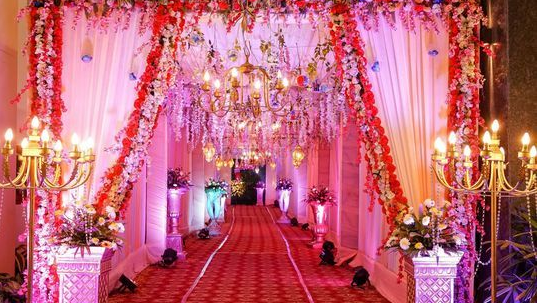The Growing Culture of Lavish Weddings in Kashmir Valley
Let's lighten the burden of wedding expenses and instead invest in the futures of the newlyweds and uphold the true essence of marriage
Post by DR. ZUBAIR AHMAD WANI on Thursday, March 28, 2024

In the verdant lap of Kashmir Valley, where the majestic Himalayas whisper tales of serene beauty, a contrary trend of extravagant weddings has taken root, casting a shadow over the very essence of matrimony. At the heart of this societal phenomenon lies a relentless pursuit of status, often at the expense of financial stability and cultural modesty. As we navigate through these grandiose celebrations, it is imperative to question whether these lavish marriages have become a curse that plagues the traditional and economic fabric of our society.
The Kashmiri wedding, historically celebrated with simplicity and a focus on cultural rituals, has undergone a radical transformation. Today's weddings are marked by excessive spending, opulent displays of wealth, and an insatiable appetite for grandeur. This extravagance is not just a reflection of personal choice but has become an unwritten mandate, pressuring families to conform to modern societal benchmarks of a 'successful' wedding.
The repercussions of this trend are manifold and deeply concerning. Economically, the pressure to host lavish weddings pushes families into a financial quagmire. Many incur debts and deplete life savings to meet the high expectations of society. The ostentatious displays of affluence are not merely financial transactions but investments in social standing, often yielding a burden that lasts long after the wedding festivities have faded.
This extravagance also fosters a competitive environment where the measure of a marriage's worth is tied to its spectacle rather than its substance. The sanctity of the matrimonial union is overshadowed by the spectacle of the event. The core values of commitment, compatibility, and love are relegated to the background, as the emphasis shifts to who had the more lavish affair.
Moreover, this competitive display of wealth exacerbates social inequalities. Kashmir valley has been grappling with many issues and uncertainties in the past including economic challenges, the prioritization of lavish weddings adds to the societal divisions. It creates an unrealistic standard that many cannot attain, leading to a sense of inadequacy and social stratification based on financial might rather than personal merit.
The environmental impact of such weddings cannot be ignored either. The extravagant use of resources contributes to unnecessary waste and environmental degradation, which is particularly poignant in a region renowned for its natural beauty. The irony of celebrating a new beginning amidst the reckless consumption of resources is a stark reminder of the need for sustainable practices.
It is time for a collective introspection and a return to the roots of Kashmiri culture, which espouses values of simplicity, community, and sustainability. Families should be encouraged to celebrate weddings in a manner that honors these values, rather than succumbing to the pressures of extravagance. By doing so, we can alleviate the financial burden on families, promote social equality, and preserve the environmental sanctity of our beloved valley.
As a society, we must challenge the notion that a wedding's grandeur is a barometer of success. Instead, we should champion the virtues of modesty and sustainability, celebrating unions that are rich in love and cultural significance rather than materialistic display. The true curse is not in the celebration of marriage, but in the distortion of its essence by the shackles of extravagance.
Tailpiece
The people of Kashmir are renowned for their resilience and adaptability and have the capacity to bring about much-needed change. A shift towards simpler, more sustainable weddings could alleviate financial burdens, reduce societal pressure, promote gender equality, and make a positive environmental impact.
In that regard religious leaders, civil society groups and elders can play a significant role in driving this change by advocating for simplicity and sustainability. Educational initiatives can further promote awareness about the adverse impacts of lavish weddings. It is the sanctity of the marriage union, not the scale of the wedding celebration that truly matters. People must ensure that weddings in Kashmir are a celebration of love, not a display of wealth.
In conclusion, while every individual has the right to celebrate their special day as they see fit, it is the collective responsibility of the Kashmiri society to foster an environment that honors tradition over ostentation, substance over show, and togetherness over individual display. It is only through such a paradigm shift that we can hope to lift the curse of lavish marriages and restore the true spirit of Kashmiri weddings. Let's lighten the burden of wedding expenses and instead invest in the futures of the newlyweds and uphold the true essence of marriage.
(Author is Asst Professor in Sociology and a Columnist)